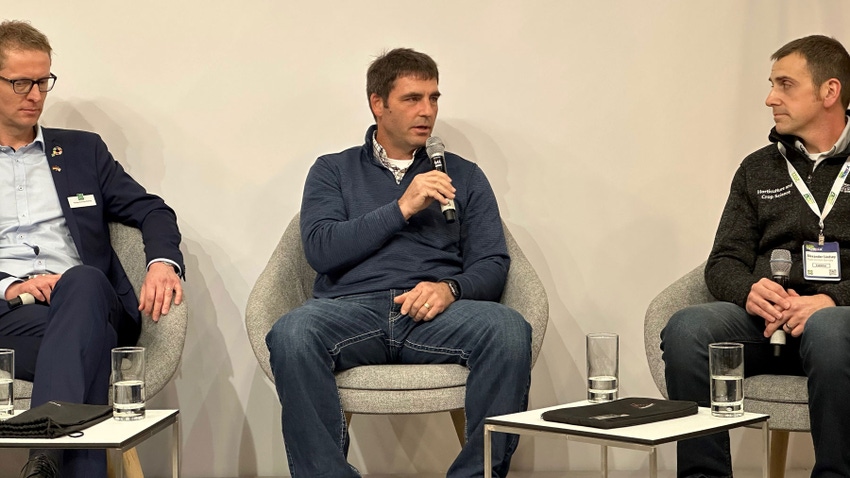November 20, 2023

Weeks of 100-plus-F temperatures in the West in 2023 made headlines in the U.S., but Europe had a super-heated summer, too. Likewise, flooding swamped farmers in the U.S. Northeast and in Germany over the summer. The rising severity of weather and climate impacts on the global food system became the focus of a panel held at Agritechnica 2023 in Hanover, Germany.
The panel was put together by the Aspen Institute Germany, a group that has partnered with the University of Illinois to promote a transatlantic dialogue on common challenges faced by agriculture. One goal of the project called U.S.-German Forum Future Agriculture is to create climate resiliency for arable agriculture.
The panel included:
A.J. Blair, a Dayton, Iowa farmer
Alex Lindsey, agronomist at Ohio State University
Philipp Schulze Esking, a farmer from North Rhine-Westphalia, Germany
Katharina Menzel, precision-ag product manager with John Deere
In opening remarks, Astric Jakobs de Padua, a representative of the German Embassy in the U.S., shared key figures of U.S. agriculture with the audience attending the panel. “Agriculture has a triple role in the climate conversation,” de Padua said. “It is a culprit, a victim” that can lose crops. “And agriculture can be part of the solution.”
She said the Biden administration is convinced of the need to better explain to farmers, legislators and all stakeholders what agriculture does, what it endures and what it can do.
De Padua shared the money in the Inflation Reduction Act targeting climate-smart farming and the imperatives associated with the U.S. effort has three key principles:
Programs must be market-oriented.
Coordination with the farmer is needed for implementation.
Equity and fair participation must be maintained among small and large operations.
The difference in Germany is many of its programs and policies include mandates, with focused reductions on specific practices.
Blair, who is part of the Aspen project, noted that programs in the United States are voluntary. “Where I am, there was a water quality push, and now a soil health and carbon effort. You can’t farm in the Midwest without knowing about it,” he said. “Things are changing, but it’s still voluntary.”
On his Century Farm, Blair said he’s seeing not only drier weather, but also better crops. “We get longer periods of drought, and when it rains, we get higher amounts but less often,” he said.
Esking has seen more challenging weather, too. “We’ve seen flooding. I’ve realized the extreme weather is more of what we’ve seen, so there is a farm shift in the growing season,” he said.
Wetter fall weather is impacting wheat quality, and Esking said more farmers are turning toward corn. During the panel, he reported that his winter wheat did get planted, but if it hadn’t, he would have switched to corn in the spring. However, fall flooding has him worried about the quality of the crop in the ground.
Looking at what’s ahead
At Agritechnica, a lot of technology is focused on farm management. Menzel said the Deere tech focuses on two major factors: providing a machine with the capacity the farmer needs, and supporting the farmer with a strong dealer network. “A majority of farmers do not utilize the tech they already own,” she said.
A focus on sustainability is part of the conversation on climate resilience. Blair said the U.S. should look at Germany to see the future. “We get the threat we may be regulated. In Germany, you are regulated. We struggle with carbon economics without fully understanding how to measure that on our farm,” he said.
Esking, who has traveled globally as chairman of the German ag society DLG and as vice president of the Technical Center for Agriculture, said, “There is always a lot to learn from other people in other parts of the world.” Moves in some countries could have “leakage affects” for others. In effect, regulations approved in one part of the world could impact others, he said.
“We need to prepare for the immediate and the future concerns related to climate change and how to become resilient to that,” Lindsey said. “I’ve put that effort to my research program at the university, now and in the future. That is important for me.”
Creating resiliency in agriculture in the face of more challenging weather won’t be easy. All the panelists acknowledge the work ahead. The panel represents several months of work in 2023 in this transatlantic partnership. “This has been a wonderful experience, and we’re just starting to see the potential I didn’t know existed,” Lindsey said.
Future work could include creating student group exchanges, collaborating on future projects and pulling together best practices to recommend to policymakers and farmers to “do the right things for the right reasons,” Lindsey concluded.
Read more about:
Climate ChangeAbout the Author(s)
You May Also Like






